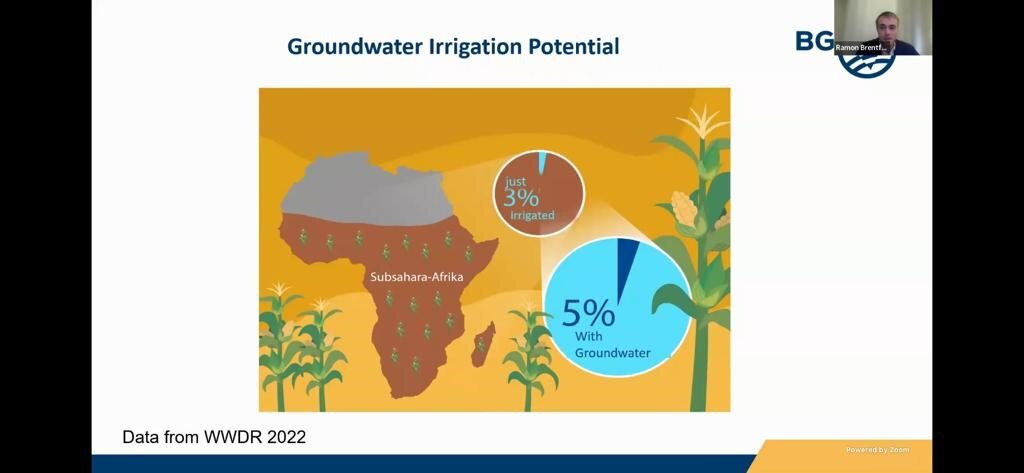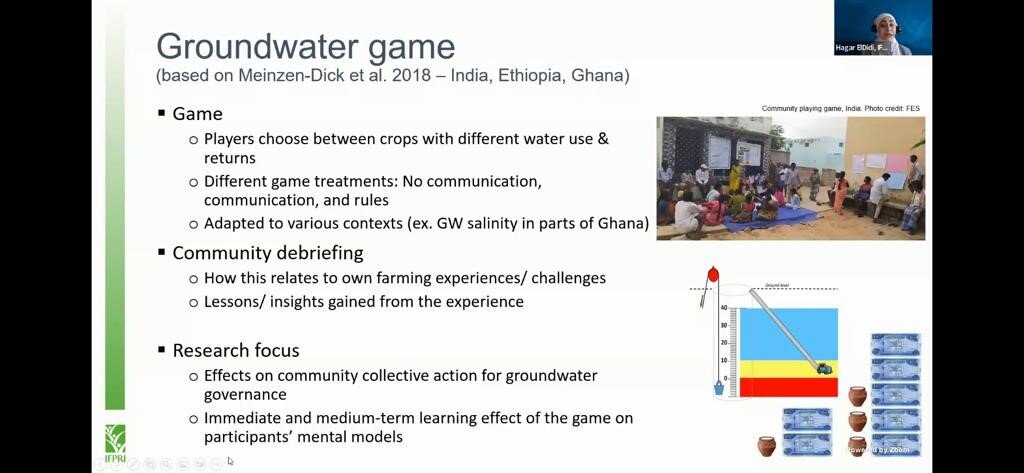By Aleksander Esmann | HAF intern
The webinar “Groundwater: Potential and Pitfalls for Africa'' took place on March 20, 2023, as a side event of the UN 2023 Water Conference. This session discussed the groundwater program of the African Ministers' Council on Water (AMCOW), including case studies on the benefits of groundwater development and institutional advances in several African countries.
Development of groundwater is key to accelerating agricultural and overall economic growth, fighting climate change, generating employment as well as achieving water and food security in Africa. However, improvements in groundwater institutions are needed to increase equity and environmental sustainability in groundwater use.
H.E. Dr. Bekele, the Ambassador of Ethiopia to the US, emphasized the potential of groundwater to transform the lives of millions of people lacking access to clean water in Africa. He pointed out that groundwater is distributed relatively evenly throughout the continent, available almost everywhere and protected from evaporation and pollution, making it a safe, reliable and sustainable water source.
However, the infrastructure for groundwater extraction is insufficient and investments in this area are very low. Rural areas suffer from a lack of access to clean water and sanitation facilities, despite big groundwater bodies being available. Dr. Bekele hopes that at the 2023 UN Water Conference more investments will be approved to develop access to groundwater for more prosperity.
Moshood from the African Ministers Council on Water (AMCOW) discussed the potential for groundwater development in Africa, stating that groundwater resources are the largest freshwater resource in Africa. Groundwater is the primary source of drinking water for 50% of people in Sub-Saharan Africa, and 80% of people in rural areas rely on it for safe water, sanitation, and hygiene. Additionally, groundwater will have to play a significant role in ensuring a reliable water supply for agriculture due to climate change and a lack of precipitation.
AMCOW's Groundwater Strategic Program aims to improve groundwater development by strengthening policies, governance, and institutional systems and establishing partnerships for investments. The council believes that groundwater has the potential to provide social, economic, and environmental benefits, including successful adaptation to climate change, and is committed to creating an enabling environment for sustainable development in Africa.
Ramon, Policy Advisor for Groundwater at the German Federal Institute for Geosciences and Natural Resources (BGR), spoke about the advantages of groundwater as a green and sustainable resource available across Africa. Because it is protected from evaporation and pollution underground it can buffer the demand for freshwater in dry periods.
In most parts of Africa, shallow aquifers require only small infrastructure investments to make groundwater accessible, making it an ideal resource for irrigation. Only 5% of irrigated land in Sub-Saharan Africa is currently irrigated with groundwater, and by exploiting its full potential, the irrigated area could be approximately doubled. Groundwater recharge is high in most regions and well productivity low, which prevents overuse and drainage of water bodies, making groundwater a sustainable and reliable water source.
Angga, senior scientist at the International Food Policy Research Institute (IFPRI), presented a study on the benefits of accelerating groundwater development in Senegal and Uganda. The study found that both countries have a considerable groundwater potential and accelerating its development could significantly increase GDP, generate millions of jobs, and reduce poverty and hunger by providing clean water to millions of people. The study also revealed that groundwater resources could benefit the whole economic landscape thanks to value chains between the agricultural and other sectors. However, stable and consistent investments from both the public and private sectors are required to achieve these goals. Additionally, institutions to monitor groundwater resources must be put into place to prevent over-extraction and ensure sustainable use in the long-term.
Hagar, senior research analyst at the IFPRI, presented the groundwater governance toolbox: ways for governments to facilitate sustainable groundwater use in Africa. To achieve that, the challenges connected with groundwater have to be overcome. Due to it being underground groundwater has a low visibility and is often not used to its full potential. Additionally many people lack understanding of its dynamics because they have not received the right education or training yet. In many parts of Africa the small-scale use of groundwater for irrigation is being promoted and expanded, but not regulated.
This creates the opportunity to improve the understanding of this resource and promote a sustainable use and put collective governance in place to avoid resource depletion before reaching a critical point. Equipped with the right knowledge and tools, community-based governance can fulfill the role of ensuring sustainable and equitable use of this resource. Various other institutional tools for groundwater governance such as regulations, financial incentives, and social learning exercises can also help with this.
The latter are particularly important as they raise awareness among community members about their responsibility towards one another and the need for collective action and rules. Social learning exercises simulate social dilemmas and give people the opportunity to work through these issues together in a forgiving environment. Tailoring these exercises to the participants' needs and holding several workshops over a longer period of time are crucial to achieving success.
These exercises have shown several benefits in the medium and long term, such as the development of collective rules for managing groundwater resources in India and changing views on groundwater as a shared and depletable resource in Ethiopia and Ghana.
Overall, the groundwater governance toolbox can pave the way for a sustainable and equitable use of this critical resource.
Julius, Water Officer at the Ministry of Water and Environment of Uganda, highlighted the crucial role that groundwater plays in economic development in Africa. To unlock greater benefits from groundwater, there needs to be a greater investment in understanding it better.
Groundwater is a reliable source of water, especially in times of climate change, and is crucial for many sectors, particularly the agricultural sector. Agriculture plays an important role in African economies and is essential for improving food security. Advancing the use of groundwater for irrigation can thus have a positive impact on both economic development and food security.
Sharing knowledge about groundwater is also essential, and frameworks for knowledge-sharing should be developed and implemented as soon as possible.
Mure, Agricultural Production and Marketing Officer of the African Union Commission, emphasized the importance of increasing access to groundwater in Africa, citing positive examples from Morocco and Ethiopia where high-value crops are being grown sustainably with the use of groundwater. However, governance issues in some countries limit access to this valuable resource.
To truly unlock the potential of groundwater in Africa, it is necessary to take concrete actions such as investing in infrastructure and technology for extraction and management of groundwater and implementing policies and regulations to ensure sustainable use. Addressing governance issues such as corruption and lack of enforcement of regulations is also crucial. It is not enough to merely declare the importance of increasing access to groundwater; action must be taken to realize the full potential of groundwater as a critical resource for economic growth and development.
Ruth, senior research fellow at the IFPRI, emphasized the critical importance of establishing functioning governance and frameworks for ensuring equal and fair access to groundwater for all citizens in Africa.
To achieve this, it is crucial to put mechanisms, processes, and institutions in place that support citizens and provide them with legal rights and protection. Collaborative processes involving people, government officials, and technical experts are also essential to ensure that everybody benefits from investments in groundwater. Effective governance mechanisms can ensure that groundwater resources are managed sustainably, and that access is equitable and transparent.
Governance issues must be addressed during groundwater development and not as an afterthought, which requires a long-term approach that considers how to continue and maintain investments. Ensuring equal and fair access to groundwater can contribute significantly to reducing poverty, improving food security, and promoting sustainable economic growth in the region.
The potential benefits of groundwater in Africa are significant, particularly in terms of improving food security and nutritional value. Groundwater development for irrigation can increase crop yields and reduce dependence on rainfall, thereby improving food security. Additionally, cheap groundwater pumps and more accessible water can help decrease the gap between men and women, as women are often responsible for fetching water. However, it is important to ensure that agricultural practices do not lower the quality of the groundwater.
Gender inequality is still an issue in some parts of Africa, but there is evidence that women have a higher learning effect for collective action and decreasing water stress. Frameworks have been put in place to encourage gender equality, but challenges remain in terms of ensuring equal and fair access to groundwater, as women often receive less education and training than men. Despite these challenges, the potential benefits of groundwater in Africa are immense and can play a vital role in improving the lives of millions of people on the continent.
By Yossef Ben-Meir | President
By Jennifer Anne Sopoci | F2F US Volunteer, HAF
Project reports on GlobalGiving are posted directly to globalgiving.org by Project Leaders as they are completed, generally every 3-4 months. To protect the integrity of these documents, GlobalGiving does not alter them; therefore you may find some language or formatting issues.
If you donate to this project or have donated to this project, you can receive an email when this project posts a report. You can also subscribe for reports without donating.
Support this important cause by creating a personalized fundraising page.
Start a Fundraiser
